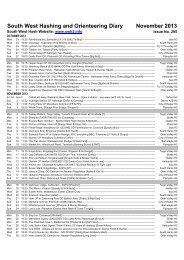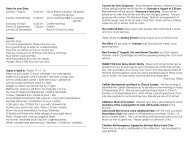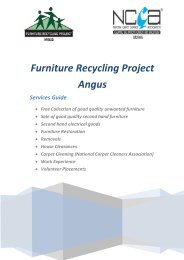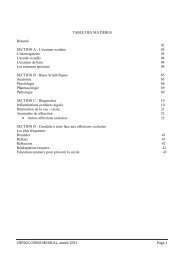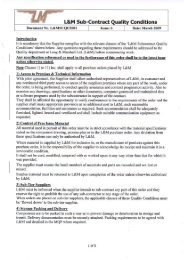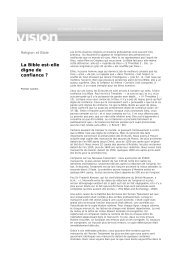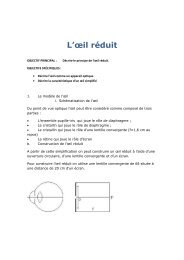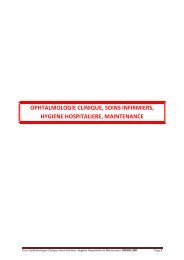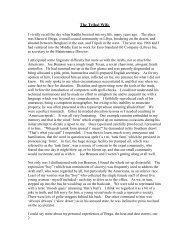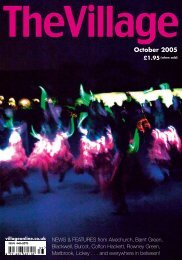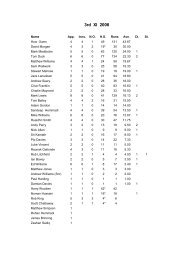Islamic Shakhsiyah Foundation –Islamic Teacher Education Course
Islamic Shakhsiyah Foundation –Islamic Teacher Education Course
Islamic Shakhsiyah Foundation –Islamic Teacher Education Course
You also want an ePaper? Increase the reach of your titles
YUMPU automatically turns print PDFs into web optimized ePapers that Google loves.
<strong>Islamic</strong> <strong>Shakhsiyah</strong> <strong>Foundation</strong> –<strong>Islamic</strong> <strong>Teacher</strong> <strong>Education</strong> <strong>Course</strong><br />
The Messenger of Allah (saw) said:<br />
“Seek Knowledge from the Cradle to the Grave” – Tirmidhi<br />
In the light of this command we as teachers cannot underestimate the importance<br />
of continuous professional development. Despite the commendable efforts of the<br />
Muslim community to establish Muslim schools there remains a great deal in the<br />
quality of educational provision which must be improved if we are to offer for our<br />
children what they are entitled to. Perhaps the most worrying and yet the most<br />
easily corrected is the need for our Muslim teachers to understand the <strong>Islamic</strong><br />
perspective on a range of contemporary educational issues. Islam provides us a<br />
clear articulation of the possible contribution that education can make to an<br />
active theory of social change which focuses on economic, cultural, intellectual,<br />
spiritual, emotional, moral as well as the physical development of individuals whilst<br />
ensuring that the outcome for the society remains uppermost in the hearts and<br />
minds of the believing educator. We as educationalists are failing our first duty if we<br />
do not have some understanding of these whilst we embark on the most<br />
challenging task of educating the next generation of Muslim children.<br />
To meet this need, and drawing upon the experience of six years of annual teacher<br />
training sessions, <strong>Islamic</strong> <strong>Shakhsiyah</strong> <strong>Foundation</strong> is offering a one year <strong>Teacher</strong><br />
<strong>Education</strong> <strong>Course</strong> within the framework of the Qur’an and Sunnah. The course is<br />
designed to offer personal and professional support for Muslim teachers and<br />
<strong>Education</strong>alists in their continuous professional development. The course is based<br />
on the ‘<strong>Shakhsiyah</strong> Framework’.<br />
We believe that this fresh approach to teacher education with a distinctly <strong>Islamic</strong><br />
perspective is unique and the <strong>Islamic</strong> <strong>Shakhsiyah</strong> <strong>Foundation</strong> is proud to be<br />
presenting such a pioneering initiative in this country.<br />
The course is open to all teachers and educators and is particularly relevant to<br />
those working in Muslim schools. The first year of this course will run between August<br />
2008 and June 2009 at ISF London Branch. Certificates of <strong>Course</strong> Completion will be<br />
issued by the <strong>Islamic</strong> <strong>Shakhsiyah</strong> <strong>Foundation</strong> in association with the International<br />
Board for <strong>Education</strong>al Research and Resources (IBERR). There are a maximum of 15<br />
places available.<br />
-1-
Aims of the <strong>Course</strong><br />
1. To develop teachers/educators who are motivated, knowledgeable and<br />
skilled in delivering education catering for the needs of Muslims in the 21 st<br />
Century.<br />
2. To develop an understanding of the aims and objectives of education from<br />
an <strong>Islamic</strong> perspective.<br />
3. To develop an understanding of <strong>Islamic</strong> concepts related to education.<br />
4. To develop an understanding of the similarities and differences between<br />
<strong>Islamic</strong> and other educational theories, concepts and perspectives.<br />
5. To develop an understanding of the responsibilities of the Muslim teacher as<br />
a role-model.<br />
6. To develop a better understanding of the role and responsibility of an<br />
educator within a culturally plural community and a multi-faith society.<br />
Learning Outcomes<br />
Participants will be able to:<br />
1. Reflect on their practice and that of others from an <strong>Islamic</strong> perspective.<br />
2. Design and deliver educational activities, ‘lessons’ and courses from an<br />
<strong>Islamic</strong> perspective.<br />
3. Actively assist in reviewing curriculum/course content and develop all<br />
aspects of educational provision with <strong>Islamic</strong> perspectives.<br />
4. Review, monitor and evaluate teaching strategies and offer advice on how<br />
best to develop them in line with <strong>Islamic</strong> perspectives.<br />
5. Use course knowledge and skills to contribute to the development of Muslim<br />
schools and other community educational projects.<br />
<strong>Course</strong> Structure<br />
The <strong>Course</strong> will consist of:<br />
Two modules consisting of 5 Units each. Each Unit will be delivered through a<br />
One Day Seminar.<br />
Module 1: Theories, concepts and perspectives of <strong>Islamic</strong> <strong>Education</strong><br />
Module 2: Practical Strategies - Curriculum, Teaching and Assessment<br />
A 3000 word Essay on one Module 1 course unit of the attendee’s choice –<br />
Deadline: 4 th October 2008<br />
A 3000 word Module 2 project demonstrating implementation of skills and<br />
concepts learnt - Deadline: 28 th March 2008<br />
Teaching Observation – Attendees will be observed in their teaching<br />
environment between January and June 2009. They will be expected to<br />
demonstrate implementation of <strong>Islamic</strong> values and practice in their teaching<br />
Required Reading – Attendees will be expected to do a certain amount of<br />
minimum reading. Other titles will also be recommended.<br />
-2-
<strong>Course</strong> Dates: [10 One Day Seminars 9.00am to 5.00pm]<br />
Module 1: Theories, concepts Module 2: Practical Strategies - and<br />
perspectives of <strong>Islamic</strong> <strong>Education</strong> Curriculum, Teaching and Assessment<br />
Monday 18 th August 2008 Saturday 1 st November 2008<br />
Tuesday 19 th August 2008 Saturday 3 rd January 2009<br />
Wednesday 20 th August 2008 Saturday 31 st January 2009<br />
Thursday 21st August 2008 Saturday 28 th February 2009<br />
Saturday 4 th October 2008 Saturday 28 th March 2009<br />
Assessment<br />
Written tasks will be assessed on a scale of pass, merit or excellent. The assignments<br />
produced will be moderated and graded by the <strong>Course</strong> Managers and the<br />
certificate of attendance will indicate the level achieved. No attendee will be<br />
allowed to ‘fail’ the assignment as individualised help and support from a<br />
designated tutor will be on offer until the assignment is deemed to have reached<br />
at least the pass level. The teaching observation will be assessed similarly.<br />
All elements of the course will need to be completed to a satisfactory level for a<br />
certificate to be issued.<br />
-3-
<strong>Course</strong> Content<br />
Seminar 1 [18.08.08] –The Concept of <strong>Education</strong> in Islam<br />
An introduction to the over all course. This seminar seeks to set a basis for the<br />
course. Attendees will question deeply held assumptions about the concept of<br />
education. Through dialogue and interactive sessions the group should devise a set<br />
of conclusions. Evidences from Qur’an, Ahadith and learned Ulema will be used to<br />
inform this dialogue.<br />
The concept of ‘<strong>Education</strong>’ from a contemporary and <strong>Islamic</strong> perspective<br />
<strong>Education</strong> for Muslims in Britain<br />
The Qur’anic concept of Tawhid as the fundamental bedrock of the <strong>Islamic</strong><br />
view of <strong>Education</strong><br />
Secular challenges that face Islam and the world<br />
Issues within Islam that need to be dealt with purposefully<br />
Arab, Asian and African Cultures – Their impact on <strong>Islamic</strong> education<br />
The relationship between the state and the function of the educational<br />
system<br />
Is Islamisation enough? What is ‘<strong>Education</strong> in the <strong>Islamic</strong> Spirit’?<br />
Can there be co-operation between ‘<strong>Islamic</strong>’ and ‘Secular’ <strong>Education</strong>?<br />
Seminar 2 [19.08.08] - Understanding the Learner from an <strong>Islamic</strong> Perspective<br />
The <strong>Islamic</strong> perspective on child development and “Every Child Matters”–<br />
The three 7 year stages in detail<br />
Loving learning for the sake of Allah<br />
Lifelong learning in practice<br />
Seminar 3 [20.08.08] - Tarbiyah – Nurturing and Development<br />
Child Centred <strong>Education</strong> and “Every Child Matters”– Allowing the fitrah to<br />
flourish<br />
Personalised learning and “Every Child Matters”– – the <strong>Islamic</strong> view of the<br />
human being<br />
Qualities of the Muslim <strong>Teacher</strong> and “Every Child Matters”– – heir to the<br />
Prophets (as)<br />
<strong>Education</strong> as a process of osmosis<br />
Imam al Ghazali’s views on tarbiyah<br />
Akhlaq<br />
The Nafs and purification<br />
-4-
Seminar 4 [21.08.08] - Ta’alim – Acquisition of Knowledge and Hikmah<br />
Sources of Knowledge in Islam – Qur’an and Hadith, the material world<br />
Hifz in the Internet age<br />
Spiritual and moral development through ta’alim<br />
<strong>Islamic</strong> concepts – Insan, Hayat, Deen, Qayyinaat, Aql, Qadaa wal Qadr –<br />
Tawhid as a basis<br />
Concept of Hikmah and wisdom<br />
Seminar 5 [ 04.10.08] – Taadib – Outward behaviour and manners<br />
The manifestation of ta’alim and tarbiyah<br />
The manifestation of ‘a Nafs in sukoon’<br />
Etiquette and manners<br />
Du’a and ‘protocol’<br />
Relationship with others - individuals, society, organisations, animals and<br />
environment<br />
Seminar 6 [01.11.08] –<strong>Shakhsiyah</strong> Islamiyah – Integrating Ta’alim, Tarbiyah and<br />
Taadib<br />
Holistic <strong>Education</strong> and the development of the individual<br />
Defining and understanding <strong>Shakhsiyah</strong> Islamiyah as the goal of education<br />
Practical strategies for Tarbiyah, Ta’alim and Taadib<br />
<strong>Teacher</strong> – Learner relationship, the need for human-scale education<br />
<strong>Shakhsiyah</strong> in the context of contemporary society<br />
Seminar 7 [03.01.09] – Halaqah<br />
The Halaqah as a historical model, from Dar al Arqam to the 21 st Century<br />
Oral Teaching to develop <strong>Shakhsiyah</strong> – incorporating tarbiyah, ta’alim and<br />
taadib<br />
The spiritual element<br />
Thinking skills, Dialogic and questioning techniques<br />
Self-reflection and ‘intuition’<br />
-5-
Seminar 8 [31.01.09] - Holistic Integrated Curriculum – Theory and Practice<br />
Thematic Planning and Holistic Learning<br />
Learning for Life [This life and the next]<br />
<strong>Education</strong> from a global perspective – universal approach<br />
<strong>Islamic</strong> and World History<br />
Skills based and understanding driven<br />
Seminar 9 [28.02.09] - Integrating Arabic – More on Integrated Curriculum<br />
Qur’anic Arabic as the language of Islam<br />
The importance of tajweed and hifz<br />
The Qur’an as the Primary sourcebook for Curriculum development<br />
Language as a tool of learning<br />
Celebrating multilingualism<br />
Arabic and Thematic planning<br />
Seminar 10 [28.03.09] - Assessment for the Learner<br />
Celebrating the learner’s work<br />
What is the purpose of assessment in <strong>Islamic</strong> <strong>Education</strong>?<br />
How can this goal be achieved?<br />
Trusting the teacher and Narrative evaluation<br />
Record keeping and target setting for personalised learning<br />
-6-




